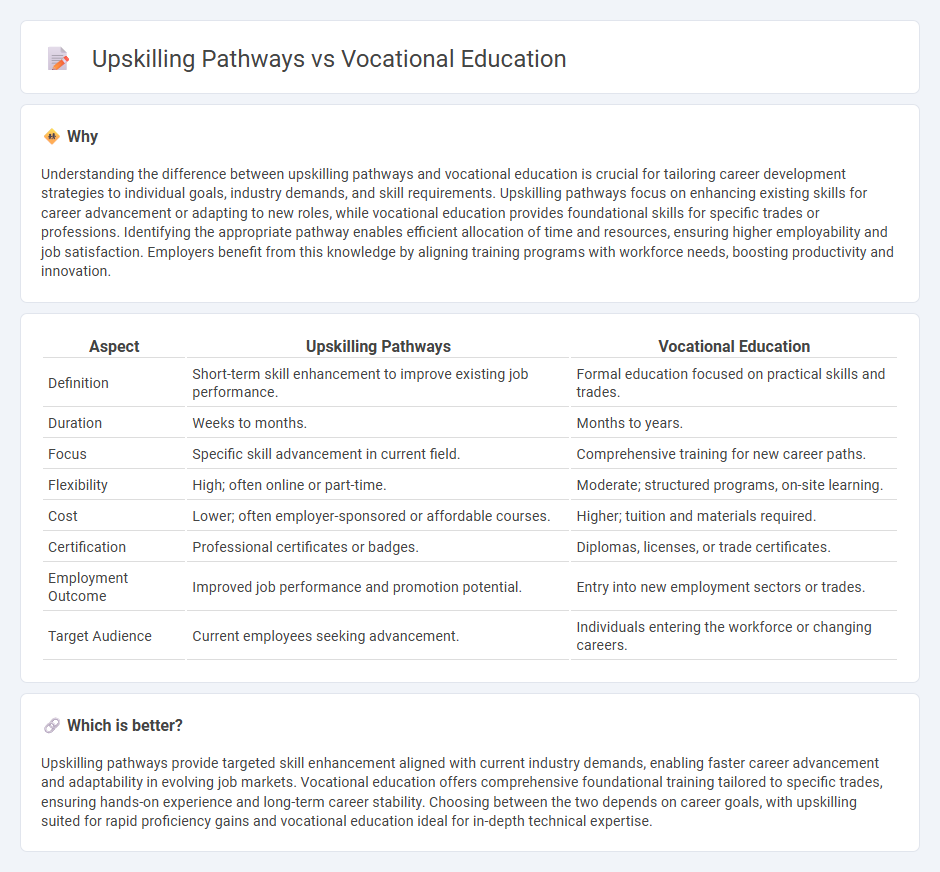
Upskilling pathways offer targeted skill enhancements tailored to evolving job market demands, enabling workers to quickly adapt and increase employability. Vocational education provides comprehensive training programs focused on specific trades or occupations, combining theoretical knowledge with practical experience for career readiness. Explore the differences and benefits of each approach to optimize your career advancement strategies.
Why it is important
Understanding the difference between upskilling pathways and vocational education is crucial for tailoring career development strategies to individual goals, industry demands, and skill requirements. Upskilling pathways focus on enhancing existing skills for career advancement or adapting to new roles, while vocational education provides foundational skills for specific trades or professions. Identifying the appropriate pathway enables efficient allocation of time and resources, ensuring higher employability and job satisfaction. Employers benefit from this knowledge by aligning training programs with workforce needs, boosting productivity and innovation.
Comparison Table
| Aspect | Upskilling Pathways | Vocational Education |
|---|---|---|
| Definition | Short-term skill enhancement to improve existing job performance. | Formal education focused on practical skills and trades. |
| Duration | Weeks to months. | Months to years. |
| Focus | Specific skill advancement in current field. | Comprehensive training for new career paths. |
| Flexibility | High; often online or part-time. | Moderate; structured programs, on-site learning. |
| Cost | Lower; often employer-sponsored or affordable courses. | Higher; tuition and materials required. |
| Certification | Professional certificates or badges. | Diplomas, licenses, or trade certificates. |
| Employment Outcome | Improved job performance and promotion potential. | Entry into new employment sectors or trades. |
| Target Audience | Current employees seeking advancement. | Individuals entering the workforce or changing careers. |
Which is better?
Upskilling pathways provide targeted skill enhancement aligned with current industry demands, enabling faster career advancement and adaptability in evolving job markets. Vocational education offers comprehensive foundational training tailored to specific trades, ensuring hands-on experience and long-term career stability. Choosing between the two depends on career goals, with upskilling suited for rapid proficiency gains and vocational education ideal for in-depth technical expertise.
Connection
Upskilling pathways and vocational education are intrinsically linked through their shared goal of enhancing workforce competencies to meet evolving industry demands. Vocational education provides targeted, hands-on training that equips individuals with practical skills, while upskilling pathways offer continuous learning opportunities to advance those skills and adapt to technological advancements. Together, they create a dynamic framework for sustained employability and career growth in a competitive job market.
Key Terms
Skills Development
Vocational education provides foundational skills through structured programs tailored to specific trades, while upskilling pathways emphasize continuous skill enhancement to adapt to evolving industry demands. Both approaches prioritize practical competencies and hands-on experience, essential for workforce readiness and career advancement. Explore how integrating vocational education with upskilling can maximize skills development and employability in today's dynamic job market.
Career Progression
Vocational education provides foundational trade-specific skills, enabling learners to enter industries such as healthcare, manufacturing, and construction with certified qualifications. Upskilling pathways focus on enhancing existing competencies through targeted training, digital courses, and workshops, facilitating career advancement and adaptability in evolving job markets. Explore comprehensive insights into how these pathways impact career progression and industry demands.
Lifelong Learning
Vocational education provides foundational skills tailored to specific trades, enabling immediate workforce entry, while upskilling pathways emphasize continuous skill enhancement aligned with evolving industry demands. Lifelong learning integrates both approaches, promoting adaptability and sustained employability across diverse career stages. Explore comprehensive strategies to optimize lifelong learning for career growth and resilience.
Source and External Links
Vocational Training: Definition and Different Types | Indeed.com - Vocational training involves instructional programs focused on skills for specific jobs or trades, offering hands-on, job-specific education often leading to certification, diplomas, or associate degrees in fields like automotive repair, plumbing, and culinary arts.
Vocational Education in the US - Vocational education at secondary and postsecondary levels provides organized courses preparing individuals for employment in specific occupations without requiring a bachelor's degree, including general and specific labor market preparation.
10 Examples of Vocational Training Programs | Goodwin University - Vocational programs offer practical, career-focused education in fields like CNC machining and welding, enabling students to gain skills rapidly and enter the workforce affordably while addressing labor shortages in technical industries.
 dowidth.com
dowidth.com